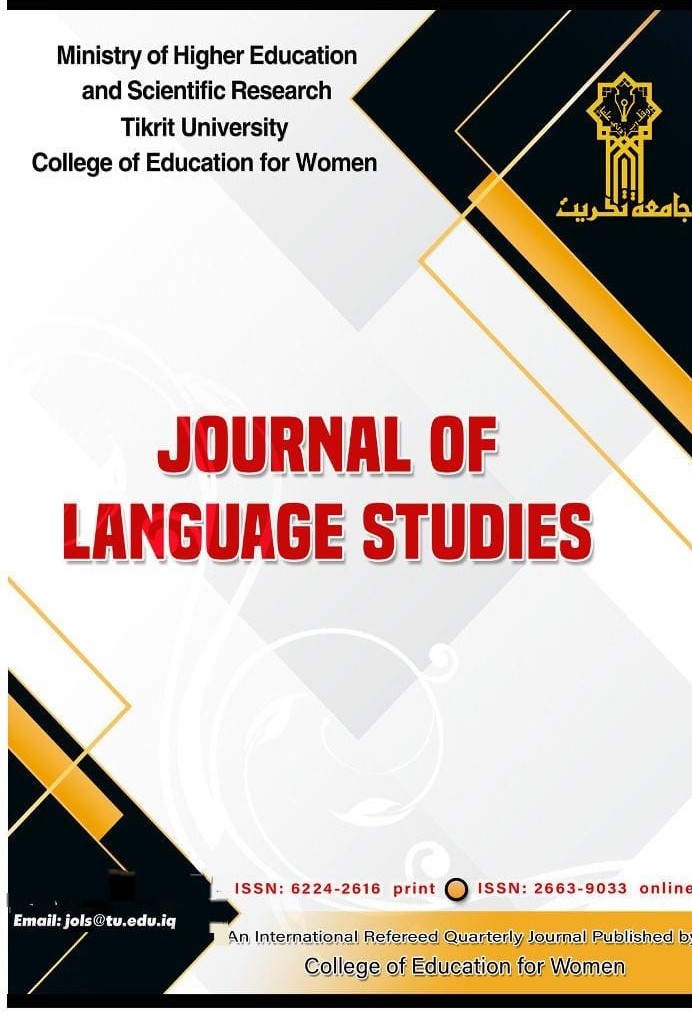Abstract
Taking into account the dimensions of language learning as well as the
contexts, which adapt to their forms of dependence in communication
or in the promotion of ways of acquiring knowledge, extends to
include all cognitive pathways that the learner can activate in the
processes of the possession of all the linguistic knowledge for one or
more languages.
It seems that taking language learning into account according to
linguistic pluralism and the cultural diversity, which characterizes
certain contexts, leads us to seek the limits of the interaction between
the cultural aspect structuring linguistic specificity and the cognitive
requirement, in which we understand the constants of the regularity of
its elements and their mental functioning. This could be of great
importance in our reflection on "bilingualism", and the cognitive
strategies that bilinguals activate to manage the variances and / or
similarities characterizing the two linguistic systems and the methods
of treatment and representation (implicit or explicit) activated in their
possession.
contexts, which adapt to their forms of dependence in communication
or in the promotion of ways of acquiring knowledge, extends to
include all cognitive pathways that the learner can activate in the
processes of the possession of all the linguistic knowledge for one or
more languages.
It seems that taking language learning into account according to
linguistic pluralism and the cultural diversity, which characterizes
certain contexts, leads us to seek the limits of the interaction between
the cultural aspect structuring linguistic specificity and the cognitive
requirement, in which we understand the constants of the regularity of
its elements and their mental functioning. This could be of great
importance in our reflection on "bilingualism", and the cognitive
strategies that bilinguals activate to manage the variances and / or
similarities characterizing the two linguistic systems and the methods
of treatment and representation (implicit or explicit) activated in their
possession.
Keywords
languages learning Bilingualism usage-based theory linguistic transfer theory cognition
Abstract
إن النظر في أبعاد تعلم اللغات، كما السياقات التي تستوعب أشكال اعتمادها في
التواصل أو في تعزيز مسارات امتالك المعارف، يتسع ليشمل مجموع المسارات
المعرفية التي يمكن للمتعلم أن ينشطها في عمليات امتالك العتاد اللساني للغة
الواحدة أو للغات المتعددة.
يبدو أن إعمال النظر في تعلم اللغات وفق معطيات التعدد اللساني، والتنوع
الثقافي الذي يسم بعض السياقات، يدفعنا إلى تلمس حدود التفاعل بين المظهر
الخصوصية اللغوية، والمقتضى المعرفي الذي به نفهم ثوابت
ْكِلُ
ي
َ
ه
ُ
الثقافي الذي ي
انتظام عناصرها واشتغالها الذهني. سيكون ذلك مهما في مسلك تدبر ظاهرة
"الثنائية اللغوية"، ورصد االستراتيجيات المعرفية التي ينشطها ثنائيو اللغة في
تدبير التباين و/أو التشابه الذي يميز نسقين لسانيين متمايزين، وطرائق المعالجة
والتمثل التي تنشط بشكل ضمني أو صريح في امتالكهما.
سننأى بعملنا هذا عن مسار البحث الذي يعالج ظاهرة "الثنائية اللغوية" وفق
موجهات اجتماعية وسياسية، ولن ننظر فيه وفق اقتضاءات التحليل التي تركن
إلى مجال السياسة اللغوية؛ ذلك أن تناول الموضوع من زوايا الصراع اللغوي،
التواصل أو في تعزيز مسارات امتالك المعارف، يتسع ليشمل مجموع المسارات
المعرفية التي يمكن للمتعلم أن ينشطها في عمليات امتالك العتاد اللساني للغة
الواحدة أو للغات المتعددة.
يبدو أن إعمال النظر في تعلم اللغات وفق معطيات التعدد اللساني، والتنوع
الثقافي الذي يسم بعض السياقات، يدفعنا إلى تلمس حدود التفاعل بين المظهر
الخصوصية اللغوية، والمقتضى المعرفي الذي به نفهم ثوابت
ْكِلُ
ي
َ
ه
ُ
الثقافي الذي ي
انتظام عناصرها واشتغالها الذهني. سيكون ذلك مهما في مسلك تدبر ظاهرة
"الثنائية اللغوية"، ورصد االستراتيجيات المعرفية التي ينشطها ثنائيو اللغة في
تدبير التباين و/أو التشابه الذي يميز نسقين لسانيين متمايزين، وطرائق المعالجة
والتمثل التي تنشط بشكل ضمني أو صريح في امتالكهما.
سننأى بعملنا هذا عن مسار البحث الذي يعالج ظاهرة "الثنائية اللغوية" وفق
موجهات اجتماعية وسياسية، ولن ننظر فيه وفق اقتضاءات التحليل التي تركن
إلى مجال السياسة اللغوية؛ ذلك أن تناول الموضوع من زوايا الصراع اللغوي،
Keywords
تعلم اللغات الثنائية اللغوية نظرية االستعمال نظربة النقل اللساني المعرفية
